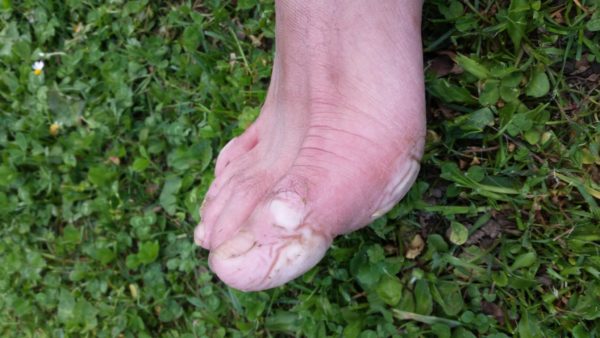A group of 12 young individuals from Afghanistan and Pakistan, aged 19-22, started to walk from Bihać in the evening of April 9, 2019.
“We were scared and lucky to not meet the Bosnian police, because they stop you, they don’t let you go to Croatia and tell you to go back to [the] camp.”
After the first night it became very rainy and all of them got really wet, all their clothes, shoes, bags and even their provision was soaked.
“It gets very dangerous, everything gets wet and slippy when you walk in the middle of the forest over the mountains. You don’t see this on the GPS.”
After three days of walking, they were able to cross the border to the Croatian side. Most of the group was exhausted and some had great issues with walking. Due to three days without shelter in the rain, the skin on their feet had gotten soft and white and began to peel off.
“It feels like you are walking on needles.”
As they were crossing a street, a police car was suddenly coming towards them. Nine individuals of the group managed to escape, but three were caught. They were interrogated for three hours by three Croatian border police officers, wearing dark blue uniforms and weapons on their belts.
“It is possible that someone saw us because Croatian people, if they see refugees they call the police.”
They were trying to get information from them about some smugglers, but the individuals didn’t know anything about that. The border police was obviously not satisfied and acted rude and disrespectful towards them and drove them only a few minutes with a van to the next police station. When they were allowed to get off, the border police started to beat them and forced them to hand all their belongings over to them. They took their phones, money, backpacks, sleeping bags and even a bracelet and a necklace while threatening them with a return to the camp in Bosnia:
“If you come here again, something will happen, there will be a big, big problem!”
Wearing their wet clothes, they were then detained in a room for two hours and threatened by the police with extensive jail time. They never took any fingerprints nor photos from them, neither did they give them any papers to sign. As there was no translator, the border police officers told one of the individuals, who was able to speak English, to translate for the others.
When two of the individuals who had bad wounds and pain on their feet, asked for medical care, one border police officer just looked at them disgusted and said:
“Jebiga” which means “Fuck off”.
They insulted them, their mothers and their families frequently and finally decided to deport them.
They then drove them in a van 20-30 minutes to a forest at the Croatian Bosnian border. During the trip they cooled the inside of the van down with the air condition, so they were freezing in their wet clothes.
“In summer they turn on the heating.”
When they were able to get off the van, the border police started again to beat them with their fists and kicked them several times in the stomach. Even when they were already lying on the ground, trying to protect themselves, they kicked them in the back. They had no orientation and didn’t know where to run to. As they were afraid of running again to the Croatian side of the border, they didn’t try to run away in the first place. After the three border police officers were done with their beating, they waited in their van for 20 minutes, watching them shivering on the wet ground and finally drove off.
The three friends were all freezing and took off their wet, cold clothes. Two of them could not walk anymore due to great pain on their feet. They made up a plan and the one who could still walk, made it in 30 minutes to the next village. There he found a taxi driver, who he could convince to bring him to the camp in Bihać. From there he had to beg the security guards several times to enter the camp in order to borrow some money from a friend. Finally, the guards brought the friend to the entrance and he gave the money to the taxi driver, begging him to get the other two friends.
“The Croatian police is very hard with refugees. If they catch us they don’t see us as humans. They look at us as if we were donkeys.”
Coordinates of detention: 44.9319, 15.5522

